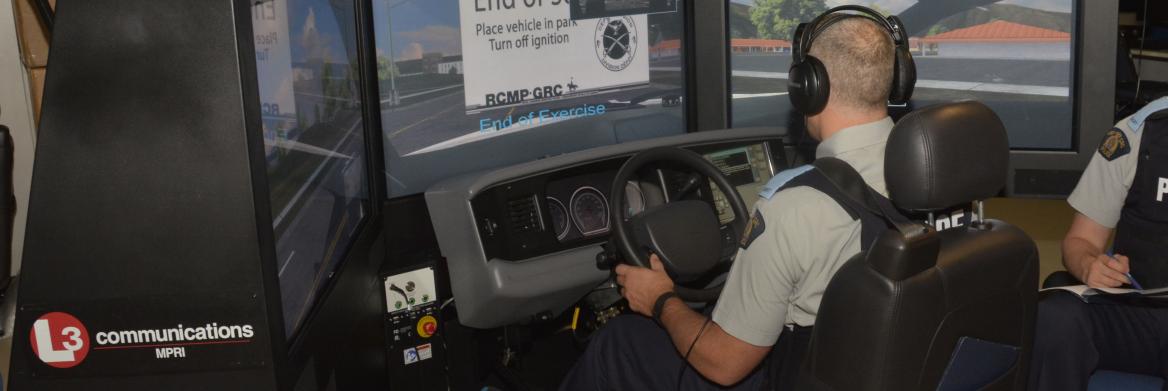Technology is making it possible for cadets at Depot to practise dangerous policing skills, such as driving at high speeds or responding to an armed suspect, in exceptionally realistic scenarios too dangerous to teach by traditional means.
Over the last six years, the division's Technology Support Services have added simulation and synthetic (or virtual) environments to its Cadet Training Program (CTP).
Situational judgement
The first use of this technology came in 2010, with the construction of judgement rooms. These prepare cadets for general duty by inserting them into video-based synthetic situations.
The judgement rooms allow cadets to apply what they have learned in class to a real-world setting, using critical thinking skills to manage risks while under stress. Cadets must learn to respond quickly and lawfully when the situations change and are expected to effectively articulate the reasoning behind their actions.
"As much as we can learn in applied police sciences, firearms and police defensive tactics, they cannot truly prepare us for the real-world stressors," says Cadet Luke Tomkinson, who has completed 17 weeks of training. "The simulator provides the opportunity to experience a taste of that stress, in the most controlled environment possible."
Driving
In 2011, eight driving simulators were installed to expose cadets to various scenarios and allow them to practise dangerous police-driving manoeuvres in a risk-free environment.
The simulators can be customized to feature adverse driving situations and extreme traffic conditions. The cadets must navigate these environments while managing tasks and reaching objectives identified by the facilitator.
The simulators are not only effective as a training tool but also from a cost standpoint.
"With a troop of 32 cadets, it would take approximately 120 facilitator hours on the driving track to cover what eight hours in the driving simulator can do," says Sgt. Blaine Landry, who is in charge of the Simulators Training Unit. "And I don't have to worry about gas, replacing tires, or blowing the transmission."
Shooting
Two synthetic firing ranges were constructed, one in 2010 and one in 2014. Each range consists of 16 virtual lanes of fire that accurately represent Depot's live-fire lanes.
Training on the synthetic range is safer and allows facilitators to teach faster. Other benefits: the pistols do not need to be reloaded and therefore do not jam, plus the targets don't need to be reset.
Cst. Alexandra Boulanger, a recent graduate now posted to Morse Detachment, Sask., credits the synthetic range with dramatically improving her shooting skills.
"The more opportunities you have to practise, the more prepared you can be for general duty," she says. "We could practise our accuracy, our grips, and our stance quickly, efficiently and safely in a controlled space. We could also practise shooting while moving. Chances are, if we have to shoot at some point in our career, we are going to be moving."
Gregory Krätzig, PhD, head of Depot's Training Innovation and Research, says the approach is proving to be effective.
"Our research has found that troops who were taught and practised exclusively on a synthetic range performed and retained skills to the same degree as those who trained in a live-fire environment," he says. "We are continuing to find new ways to expand and enhance training through the use of simulators."
Sharing best practices
Depot's commitment to cutting edge and continuous research in public safety is helping to establish national best practices in cadet training. It is also drawing the attention of police agencies from around the world.
Police from Europe, Asia and the Middle East as well as the United States have visited Depot to gain insights to improve their own police academies. The simulator training was a point of special interest with many representatives, who recognized its advantages over traditional training.
Reprinted with permission from the Pony Express ().
